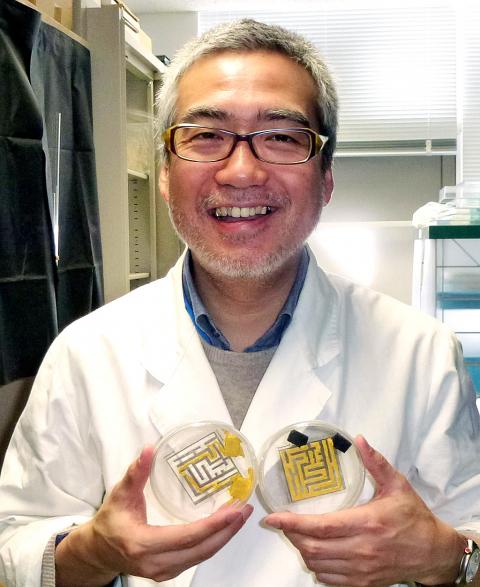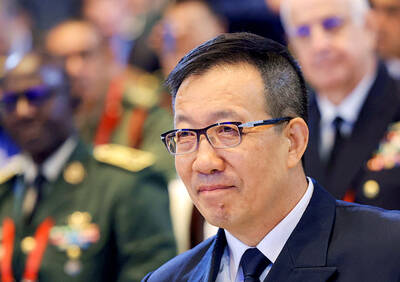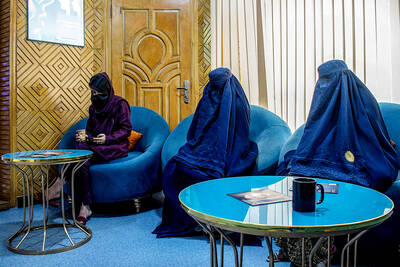A brainless, primeval organism able to navigate a maze might help Japanese scientists devise the ideal transport network design. Not bad for a mono-cellular being that lives on rotting leaves.
Amoeboid yellow slime mold has been on Earth for thousands of years, living a distinctly low-tech life, but, say scientists, it could provide the key to designing bio-computers capable of solving complex problems.
Toshiyuki Nakagaki, a professor at Future University Hakodate, says the organism, which he cultivates in petri dishes, “organizes” its cells to create the most direct route through a maze to a source of food.

Photo: AFP
He says the cells appear to have a kind of information-processing ability that allows them to “optimize” the route along which the mold grows to reach food while avoiding stresses — like light — that may damage them.
“Humans are not the only living things with information-processing abilities,” Nakagaki said in his laboratory in Hakodate on Japan’s northernmost island of Hokkaido.
“Simple creatures can solve certain kinds of difficult puzzles,” Nakagaki said. “If you want to spotlight the essence of life or intelligence, it’s easier to use these simple creatures.”
And it doesn’t get much more simple than slime mold, an organism that inhabits decaying leaves and logs and munches on bacteria.
Physarum polycephalum, or grape-cluster slime, grows large enough to be seen without a microscope and has the appearance of mayonnaise.
Nakagaki’s work with the slime was recognized by the award of Ig Nobel prizes in 2008 and last year. The spoof Nobel prizes are given to scientists who can “first make people laugh and then make them think.”
And, say his contemporaries, slime may sound like an odd place to go looking for the key to -intelligence, but it is exactly the right place to start.
Atsushi Tero, at Kyushu University in western Japan, said slime mold studies are actually quite an orthodox approach to figuring out the mechanism of human intelligence.
He said slime molds can create much more effective networks than even the most advanced technology that man has.
“Computers are not so good at analyzing the best routes that connect many base points because the volume of calculations becomes too large for them,” Tero said. “But slime molds, without calculating all the possible options, can flow over areas in an impromptu manner and gradually find the best routes.”
“Slime molds that have survived for hundreds of millions of years can flexibly adjust themselves to a change of the environment,” he said. “They can even create networks that are resistant to unexpected stimulus.”
Research has shown slime molds become inactive when subjected to stress such as temperature or humidity changes. They even appear to “remember” the stresses and protectively become inactive when they might expect to experience them.
Tero and his research team have successfully had slime molds form the pattern of a railway system quite similar to the railroad networks of the Kanto region encircling Tokyo — which were designed by hard-thinking people.
He hopes these slime mold networks will be used in future designs of new transport systems or electric transmission lines that need to incorporate detours to get around power outages.
Masashi Aono, a researcher at Riken, a natural science research institute based in Saitama, says his project aims to examine the mechanism of the human brain and eventually duplicate that brain with slime molds.
“I’m convinced that studying the information-processing capabilities of lower organisms may lead to an understanding of the human brain system,” Aono said. “That’s my motivation and ambition as a researcher.”
Aono said that among applications of so-called “slime mold neuro-computing” is the creation of new algorithm or software for computers modeled after the methods slime molds use when they form networks.
“Ultimately, I’m interested in creating a bio-computer by using actual slime molds, whose information-processing system will be quite close to that of the human brain,” Aono said.
“Slime molds do not have a central nervous system, but they can act as if they have intelligence by using the dynamism of their fluxion, which is quite amazing,” Aono said. “To me, slime molds are the window on a small universe.”

BEIJING FORUM: ‘So-called freedom of navigation advocated by certain countries outside the region challenges the norms of international relations,’ the minister said Chinese Minister of National Defense Dong Jun (董軍) yesterday denounced “hegemonic logic and acts of bullying” during remarks at a Beijing forum that were full of thinly veiled references to the US. Organizers said that about 1,800 representatives from 100 countries, including political, military and academic leaders, were in Beijing for the Xiangshan Forum. The three-day event comes as China presents itself as a mediator of fraught global issues including the wars in Ukraine and Gaza. Addressing attendees at the opening ceremony, Dong warned of “new threats and challenges” now facing world peace. “While the themes of the times — peace and development —

Venezuela on Saturday organized a day of military training for civilians in response to the US deployment in the Caribbean, and amid new threats from US President Donald Trump. About a month ago, Washington deployed warships to international waters off Venezuela’s coast, backed by F-35 jets sent to Puerto Rico in what it calls an anti-drug and anti-terrorism operation. Venezuelan Minister of Defense Vladimir Padrino Lopez has accused Washington of waging “undeclared war” in the Caribbean, after US strikes killed over a dozen alleged drug traffickers off his country’s coast. Caracas also accused the US of seeking regime change, and

Decked out with fake crystal chandeliers and velvet sofas, cosmetic surgery clinics in Afghanistan’s capital are a world away from the austerity of Taliban rule, where Botox, lip filler and hair transplants reign. Despite the Taliban authorities’ strict theocratic rule, and prevailing conservatism and poverty in Afghanistan, the 20 or so clinics in Kabul have flourished since the end of decades of war in the country. Foreign doctors, especially from Turkey, travel to Kabul to train Afghans, who equally undertake internships in Istanbul, while equipment is imported from Asia or Europe. In the waiting rooms, the clientele is often well-off and includes men

BRIBERY ALLEGATIONS: A prosecutor said they considered the risk of Hak-ja Han tampering with evidence to be very high, which led them to seek the warrant South Korean prosecutors yesterday requested an arrest warrant for the leader of the Unification Church, Hak-ja Han, on allegations of bribery linked to the country’s former first lady and incitement to destroy evidence. The move came a day after the 82-year-old was questioned over her alleged role in bribing former first lady Kim Keon-hee and a lawmaker. Founded in 1954 by her late husband, Sun Myung Moon, the Unification Church has long been the subject of controversy and criticism, with its teachings centered on Moon’s role as the “second coming” and its mass weddings. Followers are derisively referred to as “Moonies.” However, the church’s